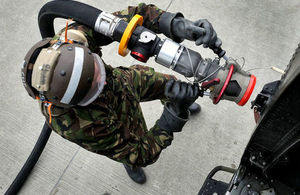Niteworks 3: Informing Acquisition for Future Aircraft Refuelling Capability
Support to Air Command in providing pan-industry research for delivering an affordable Future Aircraft Refuelling Capability that would meet the needs of the modern Royal Air Force.

The pictures shows a soldier operating the vehicle-borne aircraft refuelling capability (FARS).
Background
As the lead Front Line Command for procuring aircraft support capability across the Ministry Of Defence (MOD), Air Command ran a procurement project to replace the current vehicle-borne aircraft refuelling capability: the Future Aircraft Refueller System (FARS). This aimed to replace the in-service fleet with new refuelling tankers. However, this was found to be unaffordable and only a partial replacement of vehicles was proposed, leaving an operational capability gap. The Air Investment Approvals Committee (IAC) directed that more work was required to confirm the requirement and to explore other procurement options, including service provision.
Niteworks Task
Niteworks was tasked to support Air Command by conducting industry informed, impartial research into the requirements for FARS and options for delivering the capability, identifying cost impacts for blended solutions to meet the requirement.
How did Niteworks approach the task?
The project team engaged with MOD stakeholders to refresh and validate the refuelling capability requirements on the basis of objective evidence. Input was gathered from a range of industry partners, from vehicle manufacturers to service providers, which led to the generation of a number of options beyond the original approach of vehicle procurement. These included an option to refurbish tanks and pumping equipment on the existing vehicle fleet, at an estimated cost of approximately 25% of replacing the vehicles.
Niteworks’ industry partners also provided guidance on general principles of minimising cost drivers such as deviation from COTS vehicles and how to derive the best benefit from service provision contracts. In order to provide the evidence base to support Air Command’s decision on the procurement strategy, the team analysed the options and modelled high level costs to assess what blend of approaches would deliver the best capability and value for money.
What was the outcome?
In refreshing the refuelling requirements the study identified that the originally proposed approach of procuring 174 new vehicles would have left a significant operational capability gap. Niteworks’ analysis identified that the total requirement was 335 refuelling vehicles supplemented with changes to service provision contracts to support steady state and surge flying rates.
By identifying and analysing a blend of a number of alternative procurement approaches, the study confirmed that it would be feasible to deliver the higher target of 335 vehicles at the same time as achieving a cost saving of approximately £14m in Capital Departmental Expenditure Limit (CDEL) on the original figure - which would only have delivered a partial capability. The Niteworks team also provided a qualitative analysis of service provision options (from Government Owned Government Operated to Contractor Owned Contractor Operate) to inform decisions on future delivery of the capability.
What were the benefits?
As a result of this project and its broad engagement with industry, Headquarters Air Command received an objectively researched, evidence-based view of the requirements for aircraft refuelling capability across the MOD, the options for procuring that capability, and the cost impacts and performance factors associated with them.
This delivered the following benefits:
- Reduced project risk, as the IAC requirement for more detailed analysis was met and the FARS project avoided further unnecessary governance delays
- Reduced operational risk because the true requirement for refuelling capability was quantified and demonstrated to be affordable
- It also avoided unnecessary costs whilst RDEL remains to be considered, it was demonstrated that the CDEL cost of the FARS project could be reduced by £14m, helping the affordability of the wider Air Command programme.